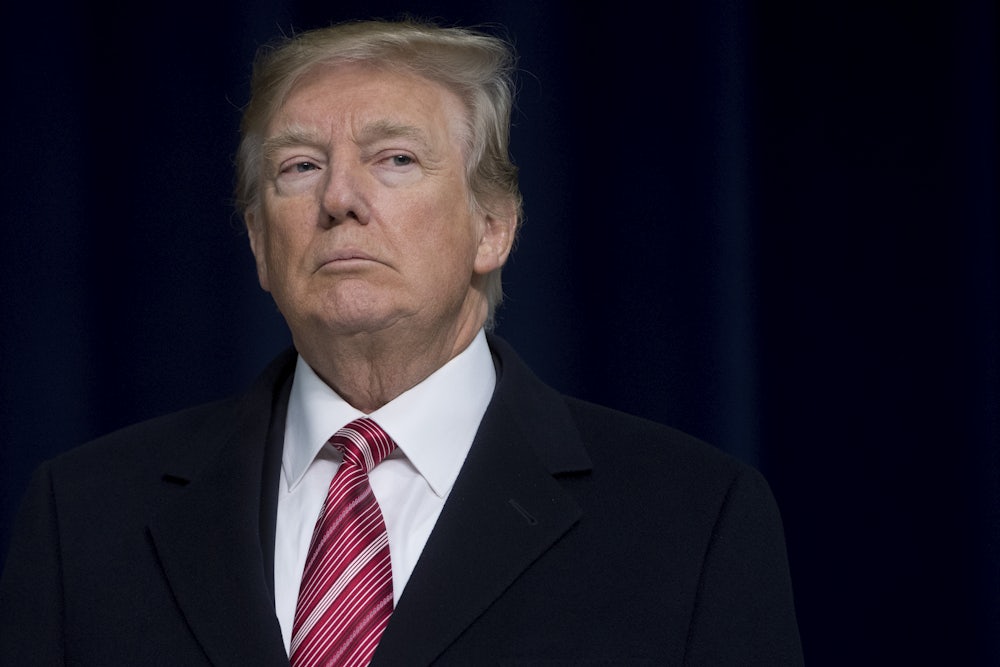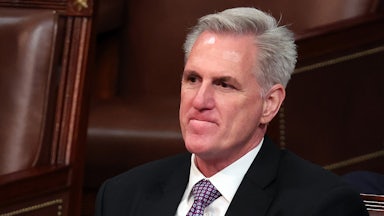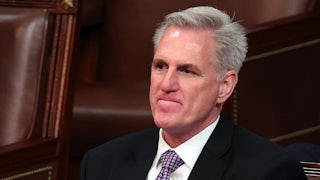Donald Trump was the big loser in Tuesday’s primaries, when voters rejected several of his handpicked candidates in Colorado. A week earlier, though, he was a winner—or at least deemed to have won a tactical victory, though not a resounding one: The first Republican who voted for his impeachment after the January 6, 2021, riot, Tom Rice, lost his bid for reelection. Of course, that same night, another South Carolina representative with a history of criticizing Trump, Nancy Mace, lived to fight another day. And in Georgia, where many of Trump’s biggest enemies were up for reelection, things broke the wrong way for the former president, a sign he’d lost his Midas touch. But hold on a minute: In Ohio and Pennsylvania, there were unmistakable signs that his endorsement was still the hottest ticket in Republican politics. So the conclusion from this year’s primaries is clear. Donald Trump’s hold on the Republican Party is as strong as ever. Also: It’s starting to slip.
For six years now, nearly every Republican primary and general election in the country has been treated as a referendum on Trump, his sway over the Republican Party, and his grip on the country. A special election in Alabama between a former federal prosecutor and a far-right judge accused of inappropriate conduct with teen girls? It’s really about Trump. A Virginia gubernatorial election between a Democratic stalwart and a wealthy businessman espousing Trump-lite views on race and education? Trump is the secret heart of that contest as well. Even international politics can’t escape Trump’s orbit. Any election with a far-right populist candidate or party—in countries as disparate as France and Colombia, to give two recent examples—is seen as a litmus test of the influence of the global far right, and therefore also of Trump himself. Any global candidate who bucks convention, shoots from the hip, and (at best) flirts with authoritarianism? That’s invariably a Trumplike figure, fueled by his rise—particularly if they are, like Colombia’s Federico Gutiérrez, a tycoon.
It’s easy to see how this trope started. The press and much of the country have obsessively monitored Trump’s influence; seven years after his now infamous voyage down an escalator in Manhattan, there are still some who hope that the fever will break. Naturally, Trump is a convenient shorthand for a candidate who is coarse and right-wing—two qualities that Trump surely invented. And global politics are distant or difficult or boring for most American news consumers, so why not spice it up by adding a patina of something they know? Trump, while overrated at most things, but as an outstanding self-brander who insists on making himself part of the conversation surrounding nearly every event in human life, is helping the media by meeting it halfway.
Viewing everything through the prism of Trump’s hold on the Republican Party and American politics has by now lost much of its meaning, if there ever was that much to begin with. The constant Trump frame steamrolls the regional and temporal distinctions that play crucial roles in individual elections. It adds to a confusing sense of whiplash—a sensation that has defined much of the coverage of the ongoing Republican primaries in 2022. Because every race is seen as a referendum on Trump’s status as a mastermind, his crown is constantly slipping off and then sliding right back on, often in an arc that confounds narrative consistency. It turns out that some Trump-backed candidates win and some lose—this is, broadly speaking, how politics works.
One aspect of this problem may be that the press has already moved on to the 2024 presidential primaries. By now, the midterms look like a fait accompli: Republicans will gain a boatload of seats and probably win majorities in both chambers of Congress. This has been so clear for so long that the 2022 elections themselves have practically ceased to be a story at all. And so the focus on the race for the GOP presidential nomination—currently seen as a battle royale between Trump and his sort-of apprentice, Florida Governor Ron DeSantis—is intensifying. And right alongside, we’ve seen a boomlet of stories questioning whether Joe Biden will or should seek a second term. With so many unknowns in the mix, Trump has become the sturdiest foundation on which to build all this way-too-early analysis. So the daily waxings and wanings of his fortunes have become the main barometer by which his chances in a race against DeSantis, Arkansas Senator Tom Cotton, or whatever other Republican might test the waters, might be measured.
Trump’s influence on the party does remain relevant, especially given his penchant for crimes and his willingness to do anything—including storming the Capitol and hanging his vice president, per recent testimony before the January 6 committee—to hold onto power. One idea implicit in the obsession with his hold on the Republican Party is that, at some point, more Republicans will step forward and acknowledge the truth: that Trump is dangerous and unqualified and that his leadership will only lead to ruin.
We know enough now to be certain that is simply not going to happen. Trump could lose the GOP primary in 2024 and still be treated as a hero and a martyr in Republican circles. Even after days of testimony making it absolutely clear beyond a reasonable doubt that he encouraged a riot at the Capitol that endangered the lives of congressional lawmakers in an attempt to hold onto power illegally, Republicans are still backing him to the hilt and decrying a legitimate investigation as a witch hunt.
Ultimately, this is the biggest problem with all of this obsessive focus on Trump: Whether or not he holds some mesmeric power over the Republican Party is in many ways irrelevant at this point. The Republican Party was slouching steadily to the right long before he came along; Trump may have accelerated the process, but naming him as the puppetmaster of the right’s descent into nativism and delusion does little service to what has actually happened to the GOP.
The Republicans have grown increasingly radical over a period of decades that started before The Beatles landed in America; Trump mostly just restarted that ever-rightward drive at a moment when Republicans were pondering taking another path. Now even the candidates who are defeating those who have earned Trump’s endorsement are far more radical than your typical Republican was two decades ago. Nancy Mace may have had to deal with a Trump-backed challenger in South Carolina, but she still backed the president on nearly everything, including his effort to reverse the 2020 election. This ultimately is the story that this framing misses: The Republican Party was growing more radical before Donald Trump; it will grow more radical after he’s gone.










